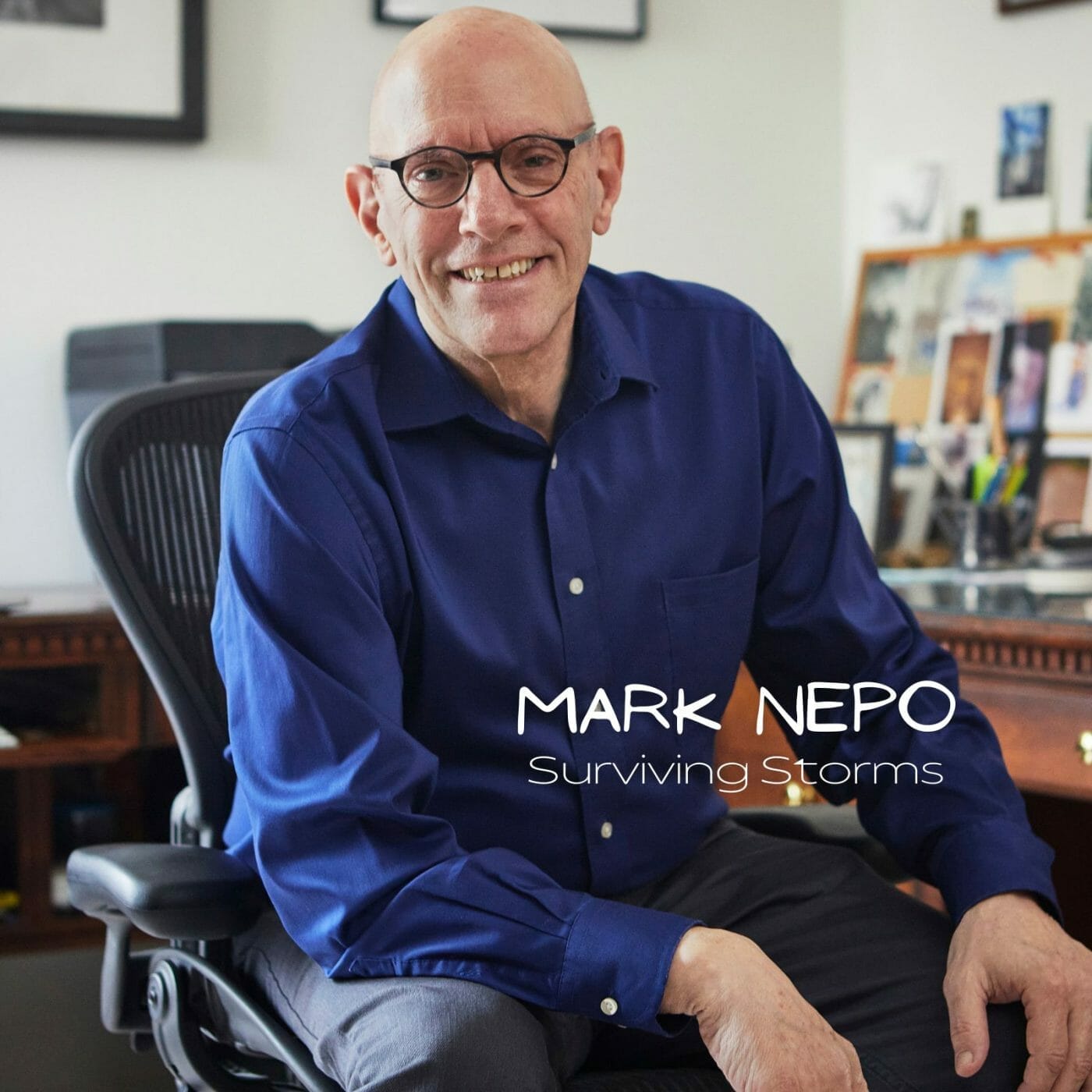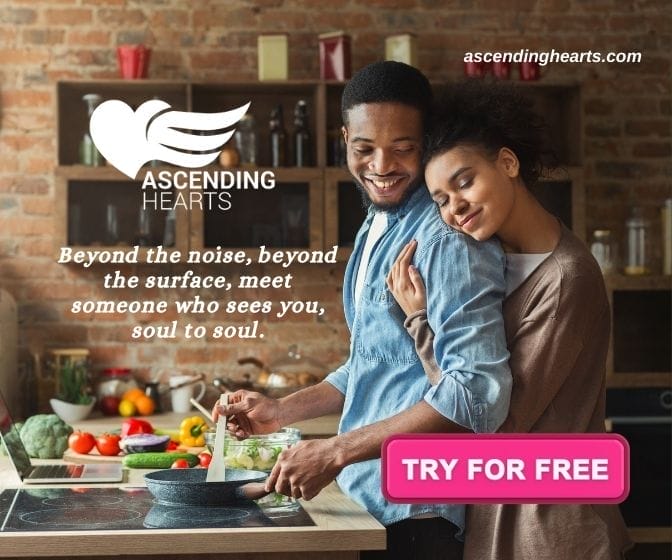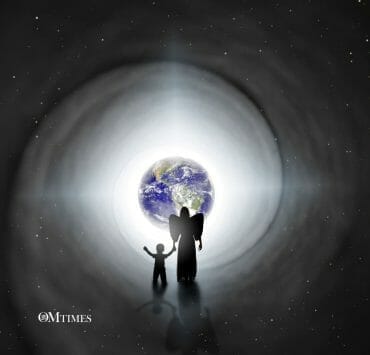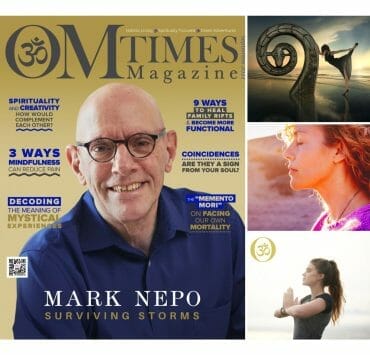Mark Nepo: Surviving Storms

Mark Nepo: Well, and yet still here. So, to not deny how difficult things are, not to deny the cruelty and disconnection. But, still, because we are addicted to the noise of things breaking apart, we have to look and listen harder for the things coming together and for that one gesture. And we will never know. If you’re in the grocery store parking lot, an old woman or man falls down and drops their groceries. You go over and pay and help them up. You will never know if that is the one photon that keeps life going today.
And still we, we have to do it, whether it is or not. So, let me bring you this ancient parable: Two monks have been told that if they study hard enough, one day, they can have an appointment with Buddha at the top of this mountain. So, they study, and finally, the day comes, and they start out halfway up the mountain when one of them breaks his leg. So, they spend the night, and the other takes care of him, intending to keep his appointment with Buddha the next day.
But when they wake up, the one who broke his leg isn’t doing well. He has a fever, and it’s not as simple as just leaving him. And the parable ends there and says, what would you do? And when we have more people in an age that will keep their appointment at the top of the mountain, no matter what, we have an age that will engender cruelty. And when we have more people who will discover that tending their broken other is the summit, we have an age that engenders compassion. And we face this choice every day, every one of us. And it doesn’t matter what you put on top of the mountain––God, security, wealth, safety, wisdom. So, this raises the real notion that our gifts, at least in my life, tend to appear when we work with what we’re given more than what we want.
There’s nothing wrong with working for what we want. It’s wonderful to have goals and dreams, but often in my life, working for what I want has been an apprenticeship for working with what I’ve been given.
Sandie Sedgbeer: I’m glad you raised that because I would like to you to share with us your wonderful metaphor of 10,000 hands because that is so beautiful.
Mark Nepo: Thank you. Again, this comes from the humility of meeting what we’re given and our limitations, which are nothing to dismiss, rationalize, or minimize. There is a whole journey in accepting and grieving the losses we encounter. Those limitations open new ways of being, feeling, and thinking.
So, it’s a metaphor; that the heart has 10,000 hands. That’s the part in us that is the infinite spirit. We want everything. We want to dream about everything. We want to go everywhere. We want to love a thousand people, but we only have two hands, and that’s the human in us. And so, when we insist on wanting what the heart wants, 10,000 hands, we will do harm. Just imagine, we’re sitting a group of us, and I want to bring you all tea, and I’m carrying 10 cups. Well, inevitably, I will spill one and maybe burn you or me or both. But if I can bring the desire from 10,000 hands into the two hands I have and bring that one cup of tea to you, it is the cup of a lifetime. And so, we are often drawn in our humanness to go out of ourselves. Like, ‘Oh, if I could love everyone…. But I’m only one person, and I can’t love everyone. Well. I can love one person well at a time.‘So, this is the trap of desire. We take our two hands and say, ‘But why can’t I do more? Why can’t I go here? Why can’t I go there?’ It’s wonderful to think about these things and even do them when you can, but we start to put life other than where we are. ‘It’s over there. If I could just get over there, it’s in the one thing I haven’t done yet. It’s in the one person I haven’t loved yet.’ And this is what embodiment is all about – not taking all of the possibilities and putting it in our two hands, on the one thing before us. Then we meet eternity. Then when I feel my pain and your pain, I am in the moment of everyone who ever felt pain. When I feel your kindness and love, I am in the moment of everyone who ever loved me. And it’s through our authenticity and bringing the 10,000 hands into the two we have that we have this blessing of experiencing eternity through the smallest moments in our lives.
Sandie Sedgbeer: So, when everything around us is reflecting back to us, all of these “10,000 things” that we should be thinking about wanting, and pursuing more, more, more… how in that kind of an environment do we find what we need to step back and say: “No, that’s not what I want”? Because it’s hard not to get distracted by everything that’s out there.
Mark Nepo: I think one of the menacing assumptions that are more acute in our time than ever is the assumption that life is other than where we are. And so, whatever person or spiritual practice we choose, and whatever combination of gifts from all the traditions work for each of us, they all reinforce and reaffirm: “Life is right where we are.”. God, or whatever name you give to it, is right where we are.
So, I really support the practice of returning to being human. We will be seduced by these things, but the work of self-awareness is to come back. How do we do that? The first thing is through presence. Whenever I am distracted, confused, in pain, or fearful, I try to give my full attention to the nearest thing – it could be the leaf on the tree outside my window – to give my full attention to the nearest bit of life until it becomes my teacher.
As you know, in the Hindu tradition, there is the term “Upaguru,” which means the teacher next to you at this moment. There’s always a teacher next to us if we can open our hearts and be there. This goes all the way back to the Book of Awakening, the subtitle of which is to have the life you want by being present in the life you have. And that has been a great teacher to me because just because I can speak these things, I’m not exempt from them, not exempt at all. I think this is how we start, bit by bit, to restore our direct connection to life. Because once we restore that direct connection, we feel how rare it is to be here. And then the reverence of life is in us again. And once the reverence of life is there, it is not so easy to do harm. I think we have so many people doing senseless harm because they have lost their reverence for life. They are actually violent. Violence is often a desperate last attempt to feel.
Sandie Sedgbeer: Presence. It’s one thing for us to understand that we need to be more present and active in creating opportunities for ourselves to be present. But how do we convey this too and encourage it in our youth?
Mark Nepo: I don’t know, but let me speak to it. My wife and I don’t have children, but I was a child; so I have some experience, but I think with children, as well as with adults, it starts with honoring and inquiring into the truth of their experience; because being present kind of implies, oh, that’s a good thing. Well, presence to pain, fear, and confusion are also necessary because presence is the key to our authenticity. And our authenticity is the key to our kinship. To our relationship, and the fact that we’re not alone, that we are part of a larger living web of connection.
So, it starts with inquiring into the truth of each person’s experience. What is it like to be you?
And, I think that it’s so important – especially with young people – to honor wherever… Where is it that you live? What is that? What is it like to be you? How do you see the world? And from that conversation, to start to affirm the authenticity, the presence. One question I often ask of adults, but it is very important for young people, is What is heartening and what is disheartening? What is life-giving, and what is life-draining?
Because often things feel complex. We get in our heads, and for me, this simplifies things. If what is before me, even if it’s difficult, is life-giving and heartening, well, then I lean all in. But what am I doing there if what’s before me is life draining and disheartening? And so how do we, through the specificity of their own knowledge, how do we encourage our young people to move toward life?
Sandie Sedgbeer: They’re good questions to ask because so often, when parents and their youth are going at it, it is about one being right and the other being wrong. They can’t get to that place where they can just stop and say, “tell me what it’s like for you. Tell me what it’s like in your world. “
Mark Nepo: I think because it’s one of those difficult things that’s gone on forever, but is more acute in our age, especially with parents and children. But even among peers, in the sense that because we feel that if I’ve gone through something, I know what it will be like for you, which is not true at all. So, whether it starts with experiencing love or pain, we make philosophies out of it. We make stances from our experience and then make political theories. And now, all of a sudden, we have all these patterns that we’re propping up rather than staying in the current of life. We’re seeing this today worldwide. All we look for is to confirm what we already know. And that’s not education.
Robert Keegan is a developmental psychologist at Harvard. One of the things he said that I quote in one of my books is that he talked about centrism, whether it’s “ego” centrism or “national” centrism, or “ethnic” centrism, whatever it might be, comes from when we mistake what is familiar as true. I think that’s profound. Because it’s familiar doesn’t mean it’s true. But when we do that, anything that’s new is false, and then we’re doomed because how do we ever grow? How do we ever grow as opposed to thanking God you are not me? Teach me something. I don’t know.
Sandie Sedgbeer: Good point. I want to talk about one particular segment of your book that has stayed with me for many days, and that is where you say, ‘the old world is gone.’
Mark Nepo: Yeah. And I imagine that other people who’ve been through life-threatening things might have had an echo like this. I was surprised when the pandemic unfolded that it brought many of my cancer journeys back. I started to pin it down to one moment that kept coming back to me. When I was first diagnosed, I had a large tumor growing in my skull bone during my journey. And I finally went to a doctor who told me that I had cancer. Of course, I was disoriented and afraid, and I thought he had the wrong folder. It couldn’t be me. He must have made a mistake. When I left his office that day, the door I had come through to keep that appointment was gone. There was no way back to life before that moment.
Continue to Page 3 of the Interview with Mark Nepo
OMTimes is the premier Spiritually Conscious Magazine. Follow Us On Facebook, Twitter, Instagram, Linkedin, Pinterest, and Youtube
A veteran broadcaster, author, and media consultant, Sandie Sedgbeer brings her incisive interviewing style to a brand new series of radio programs, What Is Going OM on OMTimes Radio, showcasing the world’s leading thinkers, scientists, authors, educators and parenting experts whose ideas are at the cutting edge. A professional journalist who cut her teeth in the ultra-competitive world of British newspapers and magazines, Sandie has interviewed a wide range of personalities from authors, scientists, celebrities, spiritual teachers, and politicians.







